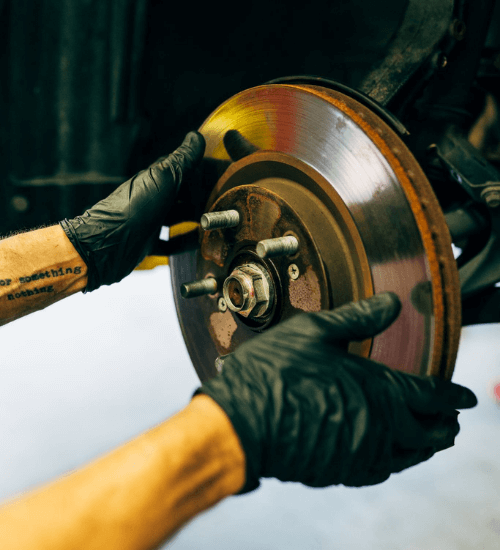Services
Brakes
The brake system on your vehicle is one of the systems that you should always keep maintained. As soon as you see a leak or hear the brakes squeaking, you need to take action.
First, if they give out completely, you won’t be able to stop and could cause an accident. Second, if you let the pads get low enough, they’ll cause additional damage, which could mean hundreds of additional dollars.
Contact the mechanics at the Repair One Tire & Auto auto repair shop in The Woodlands, TX for an appointment to check and replace the brakes on your vehicle.
The Brake System Components
Brake systems on all vehicles have similar components.
- Most vehicles have four-wheel disc brakes, which means they have brake pads, rotors, and calipers on all four wheels.
- Older vehicles might have shoes, drums, and wheel cylinders on the rear wheels.
- Antique vehicles have shoes, drums, and wheel cylinders on all four wheels.
All vehicles with hydraulic brakes have a master cylinder. This holds the brake fluid and forces it through the brake lines when the driver presses the brake pedal.
The pressure of the fluid being forced through the lines closed the calipers or wheel cylinders, which press the pads or shoes against the rotors or drums.
If you wait too long to replace the brake pads, they will score the rotors and cause the calipers to overextend.
If the rotors have not been turned before, you could save money by turning them instead of buying new ones – as long as the pads don’t make deep grooves in them.

The Emergency Brake
In many cases, the emergency brake is simply a cable that runs from the emergency brake handle or pedal to the rear brake on one wheel. When you press the pedal or pull up on the handle, the cable manually closes the pads against the rotor or forces the shoes to press against the drum.
In 2000, BMW first used an electronic emergency brake system. The older system, which is still in use on some vehicles, still has mechanical cables, but a remote motor pulls on the cable when the driver presses the electronic parking brake button.
The second version does not use cables. Instead, a motor attached to each rear brake caliper pushes the caliper piston, forcing the caliper to close and the pads to clamp around the rotor.
ABS Brakes
Vehicles with ABS (anti-locking braking system) are safer to drive.
If you slam on the brakes and the brakes on one wheel lock up, the ABS releases pressure to that wheel, then reapplies gradual pressure. On vehicles without ABS brakes, the locked wheel could send you into a spin.
- While still expensive, the ABS is not as expensive when manufacturers first started using it in the 1950s and 1960s. It was reserved for trains and jets.
- In 1953, Hans Scherenberg, who was the head of design at Mercedes-Benz, applied for a patent for ABS brakes. He worked on the system for several years.
- It wasn’t until 1970 when Mercedes-Benz first used ABS on one of its vehicles.
- Ford and Chrysler soon started working on their own systems.
- It wasn’t until 1978 when Mercedes-Benz and Bosch released the production-ready version of ABS brakes.
The system has been found on more vehicles since. Now, almost every passenger vehicle has ABS brakes.

Contact Repair One Tire & Auto for Brake Repair and Other Services
If you have a problem with your vehicle’s brakes, including the ABS, contact Repair One Tire & Auto in The Woodlands, TX for an appointment.


